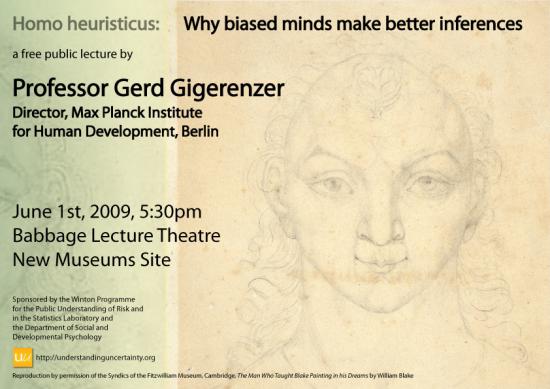Homo heuristicus
As of the 23rd May 2022 this website is archived and will receive no further updates.
understandinguncertainty.org was produced by the Winton programme for the public understanding of risk based in the Statistical Laboratory in the University of Cambridge. The aim was to help improve the way that uncertainty and risk are discussed in society, and show how probability and statistics can be both useful and entertaining.
Many of the animations were produced using Flash and will no longer work.
An event we are co-hosting with the Department of Social and Developmental Psychology "Homo heuristicus: Why biased minds make better inferences" by Professor Gerd Gigerenzer has once again got us wondering how we can make decisions in an ever uncertain world.
Prof. Gerd Gigerenzer has explored how we can understand and communicate uncertainties as well as techniques to make better decisions. He has explained to us that sometimes it's not about analysing a situation completely but accepting the short-cut to making a decision - a heuristic reliance where less can mean more!
I'm looking forward to his talk to find out how he has moved forward with this research. I plan to have another look at two of his books, Reckoning with Risk: Learning to live with uncertainty and Gut Feelings: The intelligence of the unconscious, and notice how they have influenced my decision-making after my first read.
If you're interested, please join us! The lecture is free and open to the public.

Abstract:
Heuristics are efficient cognitive processes that ignore information. In contrast to the widely held view that less processing reduces accuracy, the study of heuristics shows that less information, computation, and time can in fact improve accuracy. We review the major progress made so far: (a) the discovery of less-is-more effects; (b) the study of the ecological rationality of heuristics, which examines in which environments a given strategy succeeds or fails, and why; (c) an advancement from vague labels to computational models of heuristics; (d) the development of a systematic theory of heuristics that identifies their building blocks and the evolved capacities they exploit, and views the cognitive system as relying on an ’’adaptive toolbox;’’ and (e) the development of an empirical methodology that accounts for individual differences, conducts competitive tests, and has provided evidence for people’s adaptive use of heuristics. Homo heuristicus has a biased mind and ignores part of the available information, yet a biased mind can handle uncertainty more efficiently and robustly than an unbiased mind relying on more resource-intensive and general-purpose processing strategies.
- horace's blog
- Log in to post comments
